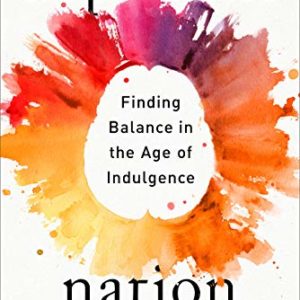There Really Is A “First World Problem”
When we hear or use the expression “first world problem” it is meant to suggest that our problems aren’t very significant compared to other people in other parts of the world.
But according to the physician who is the medical director of the Stanford Addiction Medicine program, Anna Lembke, there is a very real — non trivial — first world problem: overconsumption. Overconsumption is harming us, damaging our relationships and our capacity to live well. It’s also threatening the environment.
One example that seems illustrative: the “Cinnabon” baking stands front and center at a number of larger freeway gas stations, now called “plazas,” and in airports. Man, is that smell of butter, dough, cinnamon and sugar hitting you as soon as you open the door seductive. Just the aroma gives you a dopamine rush. And of course in terms of what’s on offer at such a place, that’s only the beginning! Say you make it by the Cinnabon bakery, surely you owe yourself a small package of M & M’s, right? But now they come in something called “the Fun Size,” which is twice as many as before!
 Here’s Lembke in her very provocative and compelling new book, Dopamine Nation: Finding Balance in the Age of Indulgence:
Here’s Lembke in her very provocative and compelling new book, Dopamine Nation: Finding Balance in the Age of Indulgence:
” . . . we’ve transformed the world from a place of scarcity to a place of overwhelming abundance: Drugs, food, news, gambling, shopping, gaming, texting, sexting. Facebooking, Instagramming, You Tubing, tweeting . . . the increased numbers, variety and potency of highly rewarding stimuli today is staggering. The smartphone is the modern day hypodermic needle, delivering digital dopamine 24/7 for a wired generation. If you haven’t met the drug of your choice yet, it’s coming soon to a website near you.”
Dopamine is the brain chemical stimulated by pleasure. Scientists measure dopamine in your brain’s reward pathway to determine the addictive potential of a substance or experience.
You keep stopping at the the Cinnabon stand or the casino or the brew-pub because it stimulates the release of dopamine, flooding you with the sensation of pleasure. The problem is that if you keep hitting the pleasure button too often, everything goes to shit. Not only that, but you need more of whatever it is you are pleasured by to get that sensation.
For most of human history the problem was scarcity. Scarcity of calories, of comfort and ease. But now our success at overcoming material scarcity has created a new set of challenges that call to us as powerfully, and as potentially fatally, as the Sirens called to Odysseus on his return trip from the Trojan War. Remember what Ody did? He had his crew lash him to the boat’s mast to keep him from caving in. This is called “self-binding,” variations on which Lembke discusses at length.
But these days the possibilities for pleasure and overconsumption have become so many and varied that we’re all at serious risk, if not for the most standard addictions, e.g. alcohol, drugs, gambling, then to over-eating, shopping, buying stuff on the internet, gaming or binging on Netflix. Because of our success in overcoming scarcity and creating material and entertainment abundance, we are facing a new world of high risk with the risk factors hidden in the guise of pleasure.
Lemke notes the way that other forces conspire to heighten the challenge. Parents today want to protect their children from anything that might be painful or difficult, while maximizing pleasure and fun. The practice of modern medicine strives for a pain-free world. Self-help material offers dozens of tips and techniques for happiness, as if a constant state of exhilaration is to be expected and the norm.
All the while Americans report being more unhappy, more anxious, more lonely and more depressed.
In a healthy life there is a balance of pleasure and pain. You may enjoy a wonderful dinner. But you endure the pain, so to speak, of not snacking between and after meals. You may enjoy a “runner’s high” at the end of your 10K, but that follows on all the training (pain) that led to being fit enough run it at all. In case you are wondering, this is called “The Science of Hormesis,” the use of painful stimuli to rebalance our adaptive systems and brain chemistry.
When you think about it there are quite a few of those ways to balance out the pleasure: “intermittent fasting” is one that is becoming a thing, though fasting is an ancient spiritual discipline. Another example would be a routine of regular exercise in which you push yourself and work up a sweat. I’ve been doing a little experiment with one minute of cold water at the end of a hot shower. Chilly, yes, but gives you a bit of an afterglow.
The problem of overconsumption is not just individual, it is systemic. Ours is a consumer economy, one that wants and needs us to consume. And it is very savvy (see “Cinnabon”) about getting us to do what just that. “You deserve a break today,” counsels McDonalds. Sure, why not, how about a large order of fries? You finally finished that Netflix series, here are three others you will like. Click here.
Years ago in his classic study The Triumph of the Therapeutic, psychologist Phillip Rieff, observed, “Religious man was born to be saved; psychological man is born to be pleased.” It is beginning to look as if we need to “saved” once again, but now we need to be saved from our over-indulgence in pleasure.
![Anthony B. Robinson [logo]](https://www.anthonybrobinson.com/wp-content/themes/anthonybrobinson/images/logo.png)
![Anthony B. Robinson [logo]](https://www.anthonybrobinson.com/wp-content/themes/anthonybrobinson/images/logo-print.png)